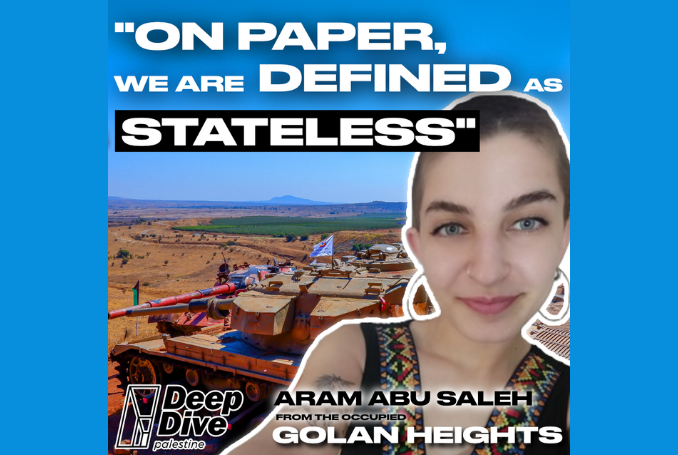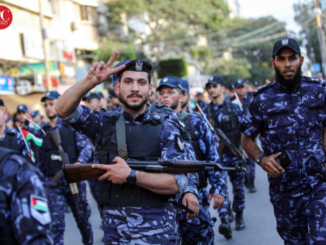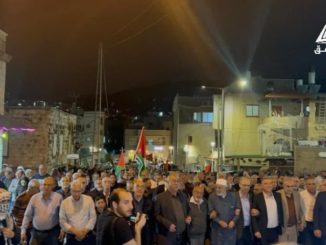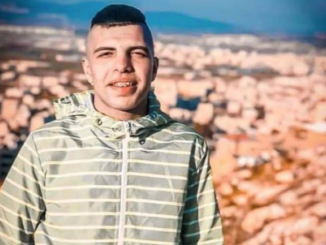
Palestine Deep Dive’s latest live show titled, ‘The Golan Heights – Occupation & Annexation Under the Spotlight’, addresses key questions concerning life in the Israeli-occupied Golan Heights today.
Deep Dive’s Host, Mark Seddon, also a former Al Jazeera correspondent and former speechwriter for UN Secretary-General Ban-ki Moon, speaks with Aram Abu Saleh, a Syrian writer and activist born in the Golan Heights.
Saleh has been involved in the Syrian political movement in the occupied Golan since she was 13-years-old and is a member of the Syrian Golan Youth movement.
She begins by reminding the audience of the largely forgotten call for Syrians’ ‘right of return’ to the Golan, just as Palestinians demand with regards to their homes occupied and annexed by Israel:
“The Golan does not only [include] the Syrians who are currently still living in the Golan like myself and my family but also [includes] the Syrians who were expelled and ethnically cleansed from the Golan in the occupation in 1967, which are now approximately half a million Syrians. You hear no one talking about their right of return, their destroyed villages or what happened in ’67.”
Emphasizing how a vast majority of Syrians in the Golan were expelled by Israel, Saleh describes the operation as Israel’s largest example of ethnic cleansing, “even bigger than the Palestinian Nakba”, with 130,000 Syrians living in the territory before 1967, but with only 13,000 remaining thereafter.
Seddon is keen to expose the duplicity of many Western nations in their self-declared commitment to upholding the “rules-based” international order:
“Of course, we have focused on the Russian invasion of Ukraine, what’s it meant for the UN Charter, but also how it is that you can call quite happily for sanctions against Russia, but in many Western countries if you call for sanctions against Israel for illegally occupying the Golan Heights, or indeed any of the occupied Palestinian territories, you run into a storm of criticism.”
The Golan Heights was occupied by Israel in 1967 during the Six Day War, and officially annexed from Syria in 1981, an annexation which continues to this day in spite of UN Security Council resolution 497.
The Resolution, adopted unanimously on 17 December 1981, declared that the Israeli Golan Heights Law, which effectively annexed the area, as “null and void and without international legal effect” and calls on Israel to rescind its action.
Demonstrating the tragic effect of Israel’s ethnic cleansing on the everyday lives of locals there, Saleh describes how her family would head to Quneitra, home of the “shouting hill”, to communicate with loved ones who had been forcibly separated:
“It’s basically two hills, one on the Syrian side and one on our side. Our families would come at important ceremonies in the year, on Mother’s Day, on the Day of Syrian Independence, on Eid… we would just use shouting as communication.”
Seddon recalled his own memories of visiting the same spot with Al Jazeera, “People watching this, it’s not just a question of shouting over a large fence. There’s quite a distance, isn’t there?”
Responding to a question on the duplicity of the international community in its expressed outrage towards Russia’s actions in Ukraine, with subsequent dire threats and sanctions, in stark contrast to the silence over the Golan, Saleh says:
“They actually have sanctions on Syria, which is starving the Syrian people… Our country is being sanctioned while the country occupying us is just freely doing whatever it wants.”
But rather than call for sanctions against Israel for its ongoing annexation of Syrian sovereign territory, in November 2020, Trump recognized the Golan Heights as Israel’s sovereign territory, the first and only country to have done so. A settlement, Trump Heights, is even being built there to honor his move which was heralded “a miracle” by Israel’s then Prime Minister Netanyahu.
And rather than reverse the U.S. position held under Trump, Biden’s administration has instead maintained it since coming to power, with Secretary of State Blinken telling CNN in February 2021: “leaving aside the legalities of that question, as a practical matter, the Golan is very important to Israel’s security”.
Yet, for those native to the Golan, the notion of security seems to be absent altogether. Saleh illuminates the decades of hardship endured there since Israel’s annexation, but also the determination of Jawlani resistance:
“When Israel annexed the Golan, it tried to also force Israeli citizenship on the Syrians remaining there. There was a huge strike which went on for six months in our communities, and the Israeli army actually sieged these five villages for six months and blocked food and milk for the children. At the end, they gave up and we still refused to take the Israeli citizenship so we have no right of voting or of participating as an Israeli. On paper, we are defined as stateless… because by Israeli law, they also forbid us to take or be active Syrian citizens.”
Asking whether Saleh considers Israeli practices in the Golan amount to the crime of apartheid, a question which was not included in the scope of Amnesty’s recent report, she responds:
“Of course, yes, I would say that. It’s obvious in so many aspects and details of life in extremely basic things like electricity and water. It’s our own water, and also this is the reason that Israel wants to keep the Golan, not only because of its strategic place because it’s basically their whole supply of water, their biggest supply of water. They took our water and they sell it to us four times more. The settler buys it four times cheaper than what we buy it. If that’s not apartheid, I don’t know what it is.”
Saleh also shines a light on the violence and trauma caused from landmines which litter the territory:
“We have a lot of people losing their hands or their legs due to accidents with these mines that Israel still refuses to remove, yes.”
Despite the decades of injustice, Saleh leaves viewers with an evocative image of what alternative life in the Golan could be like with genuine security and liberation:
“A dream – my first image is all the Syrians coming back to their villages and the Golan being full of people again just like it was, because it had a lot of communities. We had Bedouins, we had Sunni, Shia. Basically, all of the Syrian mosaic was in the Golan, so my dream is for it to be alive again like that and not empty and full of settlements. That’s what it would look like.”
Watch the show in full to learn more about life on the ground in the Golan Heights.
(Palestine Deep Dive)







